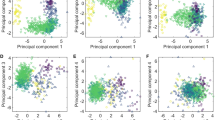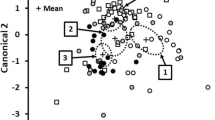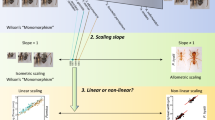Abstract
Task partitioning allows for efficient coordination of behavior in social insect colonies. Many task allocation studies focus on social insect species with discrete morphological worker subcastes, such as those possessing major and minor workers with strongly differentiated body plans. Much less is known about task partitioning among size-variable workers lacking discrete morphological subcastes. We investigated task fidelity and its correlation with worker size in Formica species with differing degrees of body size variation. During a mark-recapture study that focused on three worker tasks (honeydew collection, nest building, and protein foraging) across 2 days, 98.6% of 3570 recaptured workers exhibited task fidelity. In species with high levels of worker size variation, worker size is strongly correlated with task performance. This size-task correlation is weaker, but still present, in species with less variably sized workers. Our results suggest that Formica use size-based task partitioning, a form of morphological polyethism. We expect social insects with and without discrete morphological worker subcastes to differ in ontogeny, evolutionary history, and degree of behavioral flexibility. Identifying the scope of variation in task partitioning mechanisms will facilitate comparative studies, thereby elucidating evolutionary histories and outcomes of alternative strategies.
Significance statement
Division of labor is thought to increase the efficiency and success of animal societies by allowing the performance of multiple tasks in parallel, rather than sequentially. We investigated the task partitioning strategy employed by an ecologically dominant ant genus characterized by continuous worker size variation but lacking discrete morphological worker subcastes. We show that several species employ a form of morphological polyethism, wherein individuals specialize in tasks according to body size. Size-mediated morphological polyethism in the absence of discrete morphological worker subcastes has been demonstrated in a few other social insects. However, this task allocation strategy is likely more common than previously recognized, as most insect societies display natural worker size variation. Further, we argue that it is important to distinguish between size- and subcaste-based morphological polyethism. Alternative task partitioning strategies are likely to impact animal societies’ resilience to environmental perturbations, which are becoming increasingly common in the face of global change.



Similar content being viewed by others
Data availability
The behavioral and morphological data generated and analyzed for this study are available on Dryad, https://doi.org/10.6086/D1D965. The genomic data generated and analyzed for this study are available on NCBI GenBank, https://www.ncbi.nlm.nih.gov/bioproject/SUB6698223.
References
Alvarado S, Rajakumar R, Abouheif E, Szyf M (2015) Epigenetic variation in the Egfr gene generates quantitative variation in a complex trait in ants. Nat Commun 6:6513. https://doi.org/10.1038/ncomms7513
Batchelor TP, Santini G, Briffa M (2012) Size distribution and battles in wood ants: group resource-holding potential is the sum of the individual parts. Anim Behav 83:111–117. https://doi.org/10.1016/j.anbehav.2011.10.014
Bates D, Maechler M, Bolker B, Walker S (2014) lme4: linear mixed-effects models using Eigen and S4. R package version 1:1–7 https://github.com/lme4/lme4/
Bernard F (1968) Les fourmis (Hymenoptera Formicidae) dïEurope occidental et septentrional. Faune de l’Europe et du Bassin Méditerranéen, Volume 3, Masson et Cie, Paris
Bernstein RA (1976) The adaptive value of polymorphism in an Alpine ant, Formica neorufibarbis gelida wheeler. Psyche: A Journal of Entomology 83:180–184. https://doi.org/10.1155/1976/52542
Beshers SN, Fewell JH (2001) Models of division of labor in social insects. Annu Rev Entomol 46:413–440 0.1146/annurev.ento.46.1.413
Billick I (2002) The relationship between the distribution of worker sizes and new worker production in the ant Formica neorufibarbis. Oecologia 132:244–249. https://doi.org/10.1007/s00442-002-0976-7
Billick I, Carter C (2007) Testing the importance of the distribution of worker sizes to colony performance in the ant species Formica obscuripes Forel. Insect Soc 54:113–117. https://doi.org/10.1007/s00040-007-0918-9
Boc A, Diallo AB, Makarenkov V (2012) T-REX: a web server for inferring, validating and visualizing phylogenetic trees and networks. Nucleic Acids Res 40:W573–W579. https://doi.org/10.1093/nar/gks485
Bondroit J (1918) Les fourmis de France et de Belgique. Ann Soc Entomologique Fr 87:1–174
Breed MD, Silverman JM, Bell WJ (1978) Agonistic behavior, social interactions, and behavioral specialization in a primitively eusocial bee. Insect Soc 25:351–364. https://doi.org/10.1007/BF02224299
Brian AD (1952) Division of labour and foraging in Bombus agrorum Fabricius. J Anim Ecol 21:223–240. https://doi.org/10.2307/1959
Camargo RS, Forti LC, Lopes JFS, Andrade APP, Ottati ALT (2007) Age polyethism in the leaf-cutting ant Acromyrmex subterraneus brunneus Forel, 1911 (Hym., Formicidae). J Appl Entomol 131:139–145. https://doi.org/10.1111/j.1439-0418.2006.01129.x
Chittka L, Muller H (2009) Learning, specialization, efficiency and task allocation in social insects. Commun Integr Biol 2:151–154. https://doi.org/10.4161/cib.7600
Clutton-Brock T (2002) Breeding together: kin selection and mutualism in cooperative vertebrates. Science 296:69–72. https://doi.org/10.1126/science.296.5565.69
Core Team R (2017) R: a language and environment for statistical computing. R Foundation for statistical computing, Vienna http://www.R-project.org
Cumber RA (1949) The biology of humble-bees, with special reference to the production of the worker caste. Trans R Entomol Soc Lond 100:1–45. https://doi.org/10.1111/j.1365-2311.1949.tb01420.x
Dlussky G (1965) Ants of the genus Formica L. of Mongolia and Northeast Tibet (Hymenoptera, Formicidae). Ann Zool 23:15–43
Dussutour A, Simpson SJ (2008) Carbohydrate regulation in relation to colony growth in ants. J Exp Biol 211:2224–2232. https://doi.org/10.1242/jeb.017509
Emlen DJ, Nijhout HF (2000) The development and evolution of exaggerated morphologies in insects. Annu Rev Entomol 45:661–708. https://doi.org/10.1146/annurev.ento.45.1.661
Fisher K, West M, Lomeli AM, Woodard SH, Purcell J (2019) Are societies resilient? Challenges faced by social insects in a changing world. Insect Soc 66:5–13. https://doi.org/10.1007/s00040-018-0663-2
Fournier D, Battaille G, Timmermans I, Aron S (2008) Genetic diversity, worker size polymorphism and division of labour in the polyandrous ant Cataglyphis cursor. Anim Behav 75:151–158. https://doi.org/10.1016/j.anbehav.2007.04.023
Francoeur A (1973) Révision taxonomique des éspèces nearctique du group fusca, genre Formica (Formicidae: Hymenoptera). Mémoires de la Société Entomologique du Québec 3:1–316
Goldsby HJ, Serra N, Dyer F, Kerr B, Ofria C (2012) The evolution of temporal polyethism. Artif Life 13:178–185. https://doi.org/10.7551/978-0-262-31050-5-ch025
Gordon DM (1996) The organization of work in social insect colonies. Nature 380:121–124. https://doi.org/10.1002/cplx.10048
Grüter C, Menezes C, Imperatriz-Fonseca VL, Ratnieks FL (2012) A morphologically specialized soldier caste improves colony defense in a neotropical eusocial bee. Proc Natl Acad Sci 109:1182–1186. https://doi.org/10.1073/pnas.1113398109
Grüter C, Segers FH, Menezes C, Vollet-Neto A, Falcón T, von Zuben L, Bitondi MM, Nascimento FS, Almeida EA (2017) Repeated evolution of soldier sub-castes suggests parasitism drives social complexity in stingless bees. Nat Commun 8:4. https://doi.org/10.1038/s41467-016-0012-y
Hammel B, Vollet-Neto A, Menezes C, Nascimento FS, Engels W, Grüter C (2016) Soldiers in a stingless bee: work rate and task repertoire suggest they are an elite force. Am Nat 187:120–129. https://doi.org/10.1086/684192
Harvell CD (1994) The evolution of polymorphism in colonial invertebrates and social insects. Q Rev Biol 69:155–185. https://doi.org/10.1086/418538
Hasegawa E (1997) The optimal caste ratio in polymorphic ants: estimation and empirical evidence. Am Nat 149:706–722. https://doi.org/10.1086/286016
Herbers JM (1979) Caste-biased polyethism in a mound-building ant species. Am Midl Nat 101:69–75. https://doi.org/10.2307/2424902
Hölldobler B, Wilson EO (1990) The ants. Harvard University Press, Cambridge
Hothorn T, Bretz F, Westfall P, Heiberger RM, Schuetzenmeister A, Scheibe S, Hothorn MT (2017) Package ‘multcomp’. http://multcomp.r-forge.r-project.org/
Hughes WO, Sumner S, Van Borm S, Boomsma JJ (2003) Worker caste polymorphism has a genetic basis in Acromyrmex leaf-cutting ants. Proc Natl Acad Sci 100:9394–9397. https://doi.org/10.1073/pnas.1633701100
Jaffé R, Kronauer DJ, Bernhard Kraus F, Boomsma JJ, Moritz RF (2007) Worker caste determination in the army ant Eciton burchellii. Biol Lett 3:513–516. https://doi.org/10.1098/rsbl.2007.0257
Jandt JM, Dornhaus A (2009) Spatial organization and division of labour in the bumblebee Bombus impatiens. Anim Behav 77:641–651. https://doi.org/10.1016/j.anbehav.2008.11.019
Jandt JM, Huang E, Dornhaus A (2009) Weak specialization of workers inside a bumble bee (Bombus impatiens) nest. Behav Ecol Sociobiol 63:1829–1836. https://doi.org/10.1007/s00265-009-0810-x
Jarvis JU (1981) Eusociality in a mammal: cooperative breeding in naked mole-rat colonies. Science 212:571–573. https://doi.org/10.1126/science.7209555
Kaspari M (1996) Worker size and seed size selection by harvester ants in a Neotropical forest. Oecologia 105:397–404. https://doi.org/10.1007/BF00328743
Kuznetsova A, Brockhoff PB, Christensen RHB (2015) Package ‘lmertest’. R package version, 2.0. https://github.com/runehaubo/lmerTestR
Mertl AL, Traniello JF (2009) Behavioral evolution in the major worker subcaste of twig-nesting Pheidole (Hymenoptera: Formicidae): does morphological specialization influence task plasticity? Behav Ecol Sociobiol 63:1411–1426. https://doi.org/10.1007/s00265-009-0797-3
Muscedere ML, Willey TA, Traniello JF (2009) Age and task efficiency in the ant Pheidole dentata: young minor workers are not specialist nurses. Anim Behav 77:911–918. https://doi.org/10.1016/j.anbehav.2008.12.018
Noirot CH, Pasteels JM (1987) Ontogenetic development and evolution of the worker caste in termites. Experientia 43:851–860. https://doi.org/10.1007/BF01951642
O'Donnell S, Jeanne RL (1995) The roles of body size and dominance in division of labor among workers of the eusocial wasp Polybia occidentalis (Olivier) (Hymenoptera: Vespidae). J Kans Entomol Soc 68:43–50
Oster GF, Wilson EO (1979) Caste and ecology in the social insects. Princeton University Press, Princeton
Paradis E, Schliep K (2019) ape 5.0: an environment for modern phylogenetics and evolutionary analyses in R. Bioinformatics 35:526–528. https://doi.org/10.1093/bioinformatics/bty633
Parker J, Johnston LA (2006) The proximate determinants of insect size. J Biol 5:15. https://doi.org/10.1186/jbiol47
Parmentier T, Dekoninck W, Wenseleers T (2015) Context-dependent specialization in colony defence in the red wood ant Formica rufa. Anim Behav 103:161–167. https://doi.org/10.1016/j.anbehav.2015.02.023
Purcell J, Chapuisat M (2012) The influence of social structure on brood survival and development in a socially polymorphic ant: insights from a cross-fostering experiment. J Evol Biol 25:2288–2297. https://doi.org/10.1111/j.1420-9101.2012.02607.x
Purcell S, Neale B, Todd-Brown K, Thomas L, Ferreira MA, Bender D, Maller J, Sklar P, De Bakker PI, Daly MJ, Sham PC (2007) PLINK: a tool set for whole-genome association and population-based linkage analyses. Am J Hum Genet 81:559–575. https://doi.org/10.1086/519795
Purcell J, Brütsch T, Chapuisat M (2012) Effects of the social environment on the survival and fungal resistance of ant brood. Behav Ecol Sociobiol 66:467–474. https://doi.org/10.1007/s00265-011-1293-0
Retana J, Cerdá X (1990) Social organization of Cataglyphis cursor ant colonies (Hymenoptera, Formicidae): inter-, and intraspecific comparisons. Ethology 84:105–122. https://doi.org/10.1111/j.1439-0310.1990.tb00788.x
Revell LJ (2012) Phytools: an R package for phylogenetic comparative biology (and other things). Methods Ecol Evol 3:217–223. https://doi.org/10.1111/j.2041-210X.2011.00169.x
Richards OW (1946) Observations on Bombus agrorum (Fabricius) (Hymen., Bomhidae). Proc R Entomol Soc Lond Ser A Gen Entomol 21:66–71. https://doi.org/10.1111/j.1365-3032.1946.tb01090.x
Robinson GE (1992) Regulation of division of labor in insect societies. Annu Rev Entomol 37:637–665. https://doi.org/10.1146/annurev.en.37.010192.003225
Romiguier J, Rolland J, Morandin C, Keller L (2018) Phylogenomics of palearctic Formica species suggests a single origin of temporary parasitism and gives insights to the evolutionary pathway toward slave-making behaviour. BMC Evol Biol 18:40. https://doi.org/10.1186/s12862-018-1159-4
Sankovitz MA, Breed MD, McCreery HF (2019) Effects of Formica podzolica ant colonies on soil moisture, nitrogen, and plant communities near nests. Ecol Entomol 44:71–80. https://doi.org/10.1111/een.12677
Savolainen R, Deslippe R (2001) Facultative and obligate slave making in Formica ants. Naturwissenschaften 88:347–350. https://doi.org/10.1007/s001140100247
Scherba G (1961) Nest structure and reproduction in the mound-building ant Formica opaciventris Emery in Wyoming. J New York Entomol S 69:71–87
Schwander T, Rosset H, Chapuisat M (2005) Division of labour and worker size polymorphism in ant colonies: the impact of social and genetic factors. Behav Ecol Sociobiol 59:215–221. https://doi.org/10.1007/s00265-005-0027-6
Seid MA, Traniello JF (2006) Age-related repertoire expansion and division of labor in Pheidole dentata (Hymenoptera: Formicidae): a new perspective on temporal polyethism and behavioral plasticity in ants. Behav Ecol Sociobiol 60:631–644. https://doi.org/10.1007/s00265-006-0207-z
Shpigler H, Tamarkin M, Gruber Y, Poleg M, Siegel AJ, Bloch G (2013) Social influences on body size and developmental time in the bumblebee Bombus terrestris. Behav Ecol Sociobiol 67:1601–1612. https://doi.org/10.1007/s00265-013-1571-0
Spradbery JP (1972) A biometric study of seasonal variation in worker wasps (Hymenoptera: Vespidae). J Entomol Ser A Gen Entomol 47:61–69 0.1111/j.1365-3032.1972.tb00006.x
Stone EA (2011) Why the phylogenetic regression appears robust to tree misspecification. Syst Biol 60:245–260. https://doi.org/10.1093/sysbio/syq098
Torchiano M, Torchiano MM (2018) Package ‘effsize’. https://github.com/mtorchiano/effsize/
Trible W, Kronauer DJ (2017) Caste development and evolution in ants: it’s all about size. J Exp Biol 220:53–62. https://doi.org/10.1242/jeb.145292
Tschinkel WR (2013) The morphometry of Solenopsis fire ants. PLoS One 8:11. https://doi.org/10.1371/journal.pone.0079559
Tschinkel WR, Mikheyev AS, Storz SR (2003) Allometry of workers of the fire ant, Solenopsis invicta. J Insect Sci 3:1. https://doi.org/10.1093/jis/3.1.2
Véle A, Modlinger R (2019) Body size of wood ant workers affects their work division. Sociobiology 66:614–618. https://doi.org/10.13102/sociobiology.v66i4.4596
Vieira AS, Fernandes WD, Antonialli-Junior WF (2010) Temporal polyethism, life expectancy, and entropy of workers of the ant Ectatomma vizottoi Almeida, 1987 (Formicidae: Ectatomminae). Acta Ethologica 13:23–31. https://doi.org/10.1007/s10211-010-0069-2
Walters JR, Doerr PD, Carter JH III (1988) The cooperative breeding system of the Red-cockaded woodpecker. Ethology 78:275–305. https://doi.org/10.1111/j.1439-0310.1988.tb00239.x
Wheeler DE (1991) The developmental basis of worker caste polymorphism in ants. Am Nat 138:1218–1238. https://doi.org/10.1086/285279
Wills BD, Powell S, Rivera MD, Suarez AV (2018) Correlates and consequences of worker polymorphism in ants. Annu Rev Entomol 63:575–598. https://doi.org/10.1146/annurev-ento-020117-043357
Wilson EO (1953) The origin and evolution of polymorphism in ants. Q Rev Biol 28:136–156. https://doi.org/10.1086/399512
Wilson EO (1968) The ergonomics of caste in the social insects. Am Nat 102:41–66. https://doi.org/10.1086/282522
Wilson EO (1971) The insect societies. Harvard University Press, Cambridge
Wilson EO (1978) Division of labor in fire ants based on physical castes (Hymenoptera: Formicidae: Solenopsis). J Kans Entomol Soc 51:615–636
Wilson EO, Hölldobler B (2005a) The rise of the ants: a phylogenetic and ecological explanation. Proc Natl Acad Sci 102:7411–7414. https://doi.org/10.1073/pnas.0502264102
Wilson EO, Hölldobler B (2005b) Eusociality: origin and consequences. Proc Natl Acad Sci 102:13367–13371. https://doi.org/10.1073/pnas.0505858102
Acknowledgments
We express sincere gratitude for the field assistance provided by Christine Sosiak, without whom this work would not have been possible. We thank Alan Brelsford, Daniel Pierce, Madison Sankovitz, Aldo de la Mora Rodríguez, Amaranta Fontcuberta, S. Hollis Woodard, and two anonymous reviewers for their thoughtful comments and suggestions. We also thank the University of Calgary Biogeoscience Institute’s Barrier Lake Field Station and Kananaskis Emergency Service for accommodation and support throughout our field season.
Funding
This research was funded by the ACA Grants in Biodiversity (supported by the Alberta Conservation Association) and MW was supported in part by a fellowship from UCR NICE (NRT for Integrated Computational Entomology) National Science Foundation Award 1631776.
Author information
Authors and Affiliations
Contributions
Both authors conceived and designed the study and contributed to writing. MW carried out the fieldwork and analyses, with contributions and guidance from JP. Both authors contributed critically to writing and revising the manuscript and gave final approval for submission.
Corresponding authors
Additional information
Communicated by W. Hughes
Publisher’s note
Springer Nature remains neutral with regard to jurisdictional claims in published maps and institutional affiliations.
Electronic supplementary material
ESM 1
(PDF 603 kb)
Rights and permissions
About this article
Cite this article
West, M., Purcell, J. Task partitioning in ants lacking discrete morphological worker subcastes. Behav Ecol Sociobiol 74, 66 (2020). https://doi.org/10.1007/s00265-020-02845-w
Received:
Revised:
Accepted:
Published:
DOI: https://doi.org/10.1007/s00265-020-02845-w




